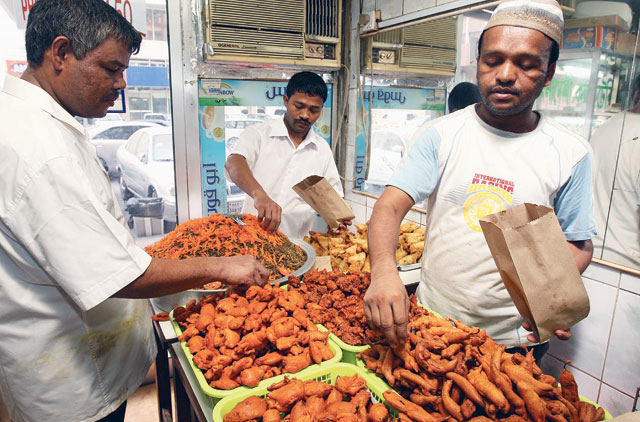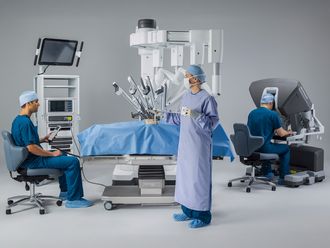Starting today, experts from Abu Dhabi Food Control Authority (ADFCA) will provide food safety tips for readers every Tuesday until the last week of Ramadan.
"Nothing is worse than a person who fills his stomach. It should be enough for the son of Adam to have a few bites to satisfy his hunger. If he wishes more, it should be: One-third for his food, one-third for his liquids, and one-third for his breath." (Prophet Mohammad, PBUH)
At the outset, ADFCA wishes all Gulf News readers a most graceful Ramadan, filled with inner and outer peace and contentment.
For the Authority, the ideal observance of the fasting month by the people complements its efforts to ensure food safety. But most people tend to spoil the occasion by excessive food consumption and unhealthy dietary habits.
Time-tested Islamic guidelines and empirically proven modern food sciences both prohibit overeating and promote moderation in food intake. In fact; if there is one word that describes the vision of Islam on all issues, that is moderation; Islam is the middle path.
Ramadan is the time to bring about that vital change in our lives which we have been postponing for far too long: a start to healthy eating habits. The month for better spiritual health must also be the period to attain better physical and mental health.
This week, we attempt to answer a set of frequently asked questions.
What are the essential factors related to eating habits and lifestyle to be taken care of during Ramadan?
- Ensure sufficient intake of water and fluids.
- Include all food groups (carbohydrates, proteins, vitamins etc) in your daily food intake.
- Ensure sufficient (and never excessive) calorie intake.
- Make sure you include appropriate amounts of fruit and vegetables, wholegrains, wholewheat bread, low-fat milk and yogurt in your diet.
- End your fast on time and eat your suhour late. Start your iftar with two to three dates or a glass of low-fat milk, or warm sweet juice.
- Include more slow-digesting (complex carbohydrates) and food containing fibre rather than fast-digesting food (simple carbohydrates).
- Try to exercise for at least 30 minutes every day and remain active throughout the day.
What are the eating habits to be avoided during Ramadan?
- Avoid fatty and fried food.
- Avoid excessive intake of sugar, salt and pickles.
- Reduce intake of red meat.
- Do not eat heavy food between iftar and suhour.
- Avoid eating quickly.
- Reduce caffeine and soda intake.
- Avoid drinking tea soon after iftar.
- Avoid iced or very hot beverages.
- Reduce fast food intake.
- Avoid overeating at all times.
- Avoid or quit smoking.
What are the basic food safety measures to be aware of during Ramadan?
Take care of the following while shopping for food products, transporting them, storing them as well as cleaning food preparation areas to avoid food poisoning and contamination.
- Read the food label carefully and pay attention to the expiry date before purchase.
- Buy frozen and refrigerated food at the very end of your shopping trip so they continue to be preserved at the required temperature and in the right conditions.
- While buying canned food, avoid bulging, dented, leaky or rusty cans.
- While shopping, do not mix food products with chemical materials, such as detergents and pesticides.
- Rushing home with the purchased food items is the best way to avoid rotten food, especially in the summer.
- Store chilled, frozen, dried and canned food in their appropriate places right away.
- Canned and dried food should be kept in dry places with good ventilation and away from sunlight.
- Store meat and frozen products in the freezer before the ice begins to melt.
- Separate ready-to-eat food from raw food items, be they meat, vegetables or any other products.
- Transfer food to clean, dry, and easy to wash containers, sealed or covered with tinfoil or plastic.
- Avoid storing warm food in the refrigerator and cool it outside so the temperature inside the refrigerator does not rise.
- Defrost frozen food in a microwave oven or on the lowest shelf of the refrigerator and never at room temperature.
- Make sure all food items in the refrigerator are covered and never left open.
- Do not fill the refrigerator with too much food, to allow adequate and free flow of cool air, ensuring the safety of the food inside.
- Do not keep cooked food inside a refrigerator for more than three to five days to avoid rotting or bacterial growth.
- Store food for freezing in small containers for quick and easy defrosting.
- While freezing food (especially meat), pack it tightly and note the date on which you freeze it.
- Always wash your hands before preparing and consuming food.
- Wash the entire surface and utensils used to prepare food (especially if it is oily food) with warm water and soap.
- Clean the refrigerator and its shelves and storage spaces in the kitchen regularly to remove crumbs and fluids that serve as fertile grounds for bacterial growth.
- Meat, especially chopped meat, should be cooked very well so its juices turn clear and the meat is free from a pink colour .
- Do not use cutting boards for meat and poultry to cut vegetables and avoid cross-contamination.
Can you explain about slow-digesting foods?
Slow-digesting foods are foods that contain grains and seeds such as barley, wheat, oats, semolina, beans, lentils, wholemeal flour, and unpolished rice. These are called complex carbohydrates.
Wholewheat, grains, seeds, vegetables (like green beans, peas and spinach), fruit with skin, dried fruit (such as dried apricots, figs, prunes, and almonds) are all examples of food containing fibre. Fast-burning foods are foods that contain ingredients such as sugar and white flour. They are called refined carbohydrates.
What are the causes of common physical discomfort such as indigestion during Ramadan?
Some common physical discomforts during Ramadan and their causes:
Indigestion: Excessive intake of food — especially of fatty and spicy foods and carbonated drinks, is the principal cause of indigestion that people may complain of during Ramadan. Lack of adequate sleep may also be a factor.
Constipation: Excessive intake of too much processed foods and a lack of fibre-containing foods and water in the diet are the main reasons. Fibre-rich food and the required amount of water and other fluids will cure this .
Lethargy: It is also caused by the consumption of heavy, fatty and starchy food in high quantities as well as insufficient sleep.
Headache: A headache during Ramadan is usually because of insufficient sleep and excessive physical activity.
Muscle cramps: Muscle cramps during Ramadan result from insufficient intake of calcium, magnesium and potassium. The solution is to include food rich in calcium, magnesium and potassium. Food rich in calcium includes broccoli, kidney beans, okra, parsnips, almonds, raisins, sesame seeds and dairy products.
Magnesium-rich foods include bran, brown rice, cornmeal, cheese, egg yolk, bananas, apples, dates, almonds, carrots, eggplant and cauliflower. Potassium-rich foods include cheese, apples, cantaloupe, apricots, pineapple, chicken, peanuts (groundnuts), cod, beet, cabbage, cucumber and green peppers.
Do you have any food safety related queries? Do you have any queries about food intake during Ramadan? Abu Dhabi Food Control Authority will answer your questions every Tuesday. Send us your questions by posting a comment below













